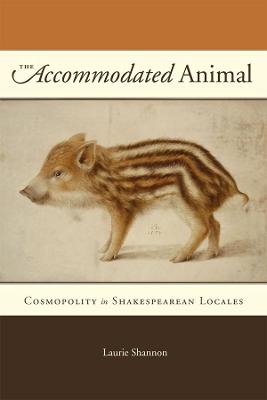
The Accommodated Animal
Cosmopolity in Shakespearean Locales
Seiten
2013
University of Chicago Press (Verlag)
978-0-226-92416-8 (ISBN)
University of Chicago Press (Verlag)
978-0-226-92416-8 (ISBN)
Shakespeare used the word 'animal' only eight times in his work - which was typical for the sixteenth century, when the word was rarely used. The author reveals that the animal-human divide first came strongly into play in the seventeenth century, with Descartes' formulation that reason sets humans above other species: 'I think, therefore I am'.
Shakespeare wrote of lions, shrews, horned toads, curs, mastiffs, and hell-hounds. But he used the word "animal" only eight times in his work - which was typical for the sixteenth century, when the word was rarely used. As Laurie Shannon reveals in "The Accommodated Animal", the animal-human divide first came strongly into play in the seventeenth century, with Descartes' famous formulation that reason sets humans above other species: "I think, therefore I am." Before that moment, animals could claim a firmer place alongside humans in a larger vision of belonging, or what Shannon terms cosmopolity. With Shakespeare as her touch-stone, Shannon explores the creaturely dispensation that existed until Descartes. She finds that early modern writers used classical natural history and readings of "Genesis" to credit animals with various kinds of stakeholdership, prerogative, and entitlement, employing the language of politics in a constitutional vision of cosmic membership.
Using this political idiom to frame cross-species relations, Shannon argues, carried with it the notion that animals possess their own investments in the world, a point distinct from the question of whether animals have reason. It also enabled a sharp critique of the tyranny of humankind. By answering "the question of the animal" historically, "The Accommodated Animal" makes a brilliant contribution to cross-disciplinary debates engaging political theory, intellectual history, and literary studies.
Shakespeare wrote of lions, shrews, horned toads, curs, mastiffs, and hell-hounds. But he used the word "animal" only eight times in his work - which was typical for the sixteenth century, when the word was rarely used. As Laurie Shannon reveals in "The Accommodated Animal", the animal-human divide first came strongly into play in the seventeenth century, with Descartes' famous formulation that reason sets humans above other species: "I think, therefore I am." Before that moment, animals could claim a firmer place alongside humans in a larger vision of belonging, or what Shannon terms cosmopolity. With Shakespeare as her touch-stone, Shannon explores the creaturely dispensation that existed until Descartes. She finds that early modern writers used classical natural history and readings of "Genesis" to credit animals with various kinds of stakeholdership, prerogative, and entitlement, employing the language of politics in a constitutional vision of cosmic membership.
Using this political idiom to frame cross-species relations, Shannon argues, carried with it the notion that animals possess their own investments in the world, a point distinct from the question of whether animals have reason. It also enabled a sharp critique of the tyranny of humankind. By answering "the question of the animal" historically, "The Accommodated Animal" makes a brilliant contribution to cross-disciplinary debates engaging political theory, intellectual history, and literary studies.
Laurie Shannon is associate professor of English and the Wender Lewis Teaching and Research Professor at Northwestern University.
| Erscheint lt. Verlag | 4.1.2013 |
|---|---|
| Sprache | englisch |
| Maße | 16 x 23 mm |
| Gewicht | 567 g |
| Themenwelt | Literatur ► Lyrik / Dramatik ► Dramatik / Theater |
| Geschichte ► Allgemeine Geschichte ► Neuzeit (bis 1918) | |
| Geisteswissenschaften ► Sprach- / Literaturwissenschaft ► Anglistik / Amerikanistik | |
| Geisteswissenschaften ► Sprach- / Literaturwissenschaft ► Literaturgeschichte | |
| Geisteswissenschaften ► Sprach- / Literaturwissenschaft ► Literaturwissenschaft | |
| Sozialwissenschaften ► Soziologie | |
| ISBN-10 | 0-226-92416-5 / 0226924165 |
| ISBN-13 | 978-0-226-92416-8 / 9780226924168 |
| Zustand | Neuware |
| Informationen gemäß Produktsicherheitsverordnung (GPSR) | |
| Haben Sie eine Frage zum Produkt? |
Mehr entdecken
aus dem Bereich
aus dem Bereich
Giordano Bruno - ein ketzerisches Leben
Buch | Hardcover (2024)
C.H.Beck (Verlag)
29,90 €
das dramatische 16. Jahrhundert
Buch | Hardcover (2024)
Rowohlt Berlin (Verlag)
34,00 €
die Fahrt der Bounty und die globale Wirtschaft im 18. Jahrhundert
Buch | Hardcover (2024)
Klett-Cotta (Verlag)
25,00 €


